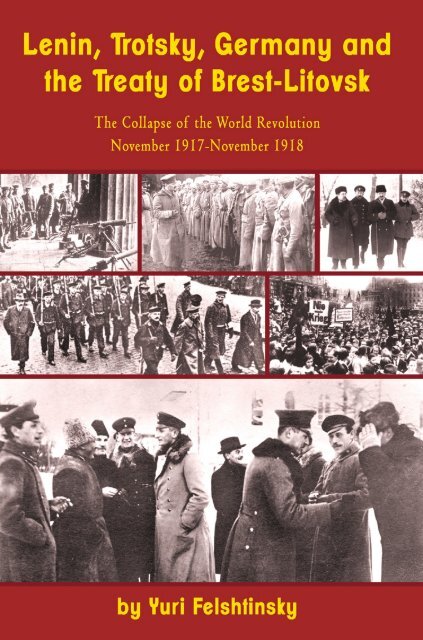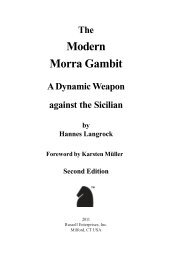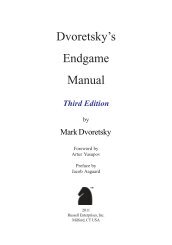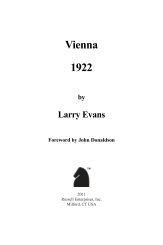Lenin, Trotsky, Germany and the Treaty of Brest-Litovsk The ...
Lenin, Trotsky, Germany and the Treaty of Brest-Litovsk The ...
Lenin, Trotsky, Germany and the Treaty of Brest-Litovsk The ...
You also want an ePaper? Increase the reach of your titles
YUMPU automatically turns print PDFs into web optimized ePapers that Google loves.
<strong>Lenin</strong>, <strong>Trotsky</strong>, <strong>Germany</strong><strong>and</strong> <strong>the</strong> <strong>Treaty</strong> <strong>of</strong> <strong>Brest</strong>-<strong>Litovsk</strong><strong>The</strong> Collapse <strong>of</strong> <strong>the</strong> World Revolution,November 1917-November 1918Yuri Felshtinsky®2012Russell Enterprises, Inc.Milford, CT USA1
<strong>Lenin</strong>, <strong>Trotsky</strong>, <strong>Germany</strong> <strong>and</strong> <strong>the</strong> <strong>Treaty</strong> <strong>of</strong> <strong>Brest</strong>-<strong>Litovsk</strong><strong>Lenin</strong>, <strong>Trotsky</strong>, <strong>Germany</strong> <strong>and</strong> <strong>the</strong> <strong>Treaty</strong> Of <strong>Brest</strong>-<strong>Litovsk</strong>:<strong>The</strong> Collapse <strong>of</strong> <strong>the</strong> World Revolution, November 1917-November 1918by Yuri FelshtinskyISBN: 978-1-936490-48-6© Copyright 2012Yuri FelshtinskyAll Rights ReservedNo part <strong>of</strong> this book may be used, reproduced, stored in a retrieval systemor transmitted in any manner or form whatsoever or by any means, electronic,electrostatic, magnetic tape, photocopying, recording or o<strong>the</strong>rwise,without <strong>the</strong> express written permission from <strong>the</strong> publisher except in <strong>the</strong>case <strong>of</strong> brief quotations embodied in critical articles or reviews.Published by:Russell Enterprises, Inc.P.O. Box 3131Milford, CT 06460 USAhttp://www.russell-enterprises.cominfo@russell-enterprises.comCover design by Janel LowrancePrinted in <strong>the</strong> United States <strong>of</strong> America®We invite you to “like” Russell Enterprises on Facebook!2
Table <strong>of</strong> ContentsIntroduction 5Chapter 1: <strong>The</strong> Bolsheviks <strong>and</strong> <strong>Germany</strong> 16Chapter 2: <strong>The</strong> Birth <strong>of</strong> <strong>the</strong> Bolshevik-Left SR Coalition 31Chapter 3: <strong>The</strong> Formation <strong>of</strong> <strong>the</strong> Soviet Government 47Chapter 4: <strong>The</strong> Beginning <strong>of</strong> Peace Talks in <strong>Brest</strong>-<strong>Litovsk</strong> 65Chapter 5: <strong>The</strong> Convocation <strong>and</strong> Dissolution <strong>of</strong> <strong>the</strong> Constituent Assembly 85Chapter 6: <strong>The</strong> Problem <strong>of</strong> Revolutionary War 103Chapter 7: <strong>Trotsky</strong>’s Middle Way (Nei<strong>the</strong>r War nor Peace) 119Chapter 8: <strong>Lenin</strong>’s Middle Way (<strong>The</strong> Respite) 131Chapter 9: <strong>The</strong> Peace that Never Was: <strong>The</strong> Transcaucasus 150Chapter 10: <strong>The</strong> Peace that Never Was: Ukraine 160Chapter 11: <strong>The</strong> Strategy <strong>of</strong> Desperation 168Chapter 12: On <strong>the</strong> Way to a One-Party Dictatorship, April-June 179Chapter 13: Count Mirbach’s Mission 198Chapter 14: <strong>The</strong> Assassination <strong>of</strong> Mirbach 206Chapter 15: <strong>The</strong> Destruction <strong>of</strong> <strong>the</strong> Left SR Party 223Chapter 16: <strong>The</strong> Breakdown <strong>of</strong> <strong>the</strong> <strong>Brest</strong>-<strong>Litovsk</strong> <strong>Treaty</strong> 251Epilogue 266Chronology 275Abbreviations 284Bibliography 285Endnotes 303Index 345About <strong>the</strong> Author 3523
IntroductionThis book is devoted to <strong>the</strong> history <strong>of</strong> <strong>the</strong> <strong>Treaty</strong> <strong>of</strong> <strong>Brest</strong>-<strong>Litovsk</strong>, signed onMarch 3, 1918 by <strong>the</strong> Soviet government <strong>and</strong> <strong>the</strong> Central Powers 1 . In all <strong>of</strong> Sovietforeign policy, <strong>the</strong>re was probably no agreement more fragile than this one: lastingfor slightly more than nine months, <strong>the</strong> <strong>Brest</strong>-<strong>Litovsk</strong> treaty was annulled by<strong>the</strong> German <strong>and</strong> Soviet governments, <strong>and</strong> subsequently, following <strong>Germany</strong>’scapitulation in World War I, also repealed by <strong>the</strong> 116th article <strong>of</strong> <strong>the</strong> <strong>Treaty</strong> <strong>of</strong>Versailles. Nonchalantly characterized as a “respite” by Vladimir <strong>Lenin</strong>, <strong>the</strong> agreementmet with criticism <strong>and</strong> resistance from an overwhelming majority <strong>of</strong> revolutionaries,on <strong>the</strong> one h<strong>and</strong>, <strong>and</strong> <strong>of</strong> Russian patriots, on <strong>the</strong> o<strong>the</strong>r. <strong>The</strong> former claimedthat <strong>the</strong> <strong>Treaty</strong> <strong>of</strong> <strong>Brest</strong>-<strong>Litovsk</strong> was a stab in <strong>the</strong> back <strong>of</strong> <strong>the</strong> German revolution.<strong>The</strong> latter called it a betrayal <strong>of</strong> Russia <strong>and</strong> its allies. Both were, in <strong>the</strong>ir own way,correct. However, for reasons that no one could fathom, <strong>Lenin</strong> insisted on <strong>the</strong><strong>Treaty</strong> <strong>of</strong> <strong>Brest</strong>-<strong>Litovsk</strong> <strong>and</strong> finally saw it ratified.<strong>The</strong> evolution <strong>of</strong> <strong>Lenin</strong>’s views after he came to power in November 1917*, <strong>and</strong><strong>the</strong> aims that <strong>Lenin</strong> set for himself before <strong>and</strong> after <strong>the</strong> takeover, are crucial issuesfor <strong>the</strong> study <strong>of</strong> <strong>the</strong> history <strong>of</strong> <strong>the</strong> <strong>Treaty</strong> <strong>of</strong> <strong>Brest</strong>-<strong>Litovsk</strong> – <strong>and</strong> crucial issues, aswell, for <strong>the</strong> history <strong>of</strong> <strong>the</strong> world revolution. It would be a mistake to believe that<strong>Lenin</strong>’s views changed with changing circumstances. It would be more correct tosuppose that in any situation he found <strong>the</strong> best means <strong>of</strong> achieving his goals. <strong>The</strong>claim can be made that <strong>Lenin</strong>’s whole adult life was devoted to struggle – <strong>and</strong>beginning around 1903, to a struggle for power. It would be difficult to say whe<strong>the</strong>rhe needed power in order to secure victory for <strong>the</strong> revolution or whe<strong>the</strong>r <strong>the</strong>revolution was for him a means to obtain power.Since until 1917 <strong>Germany</strong> appeared to be <strong>the</strong> leader <strong>of</strong> <strong>the</strong> revolutionary movement—itsSocial Democratic Party was <strong>the</strong> most powerful in <strong>the</strong> world – a worldrevolution naturally presupposed a revolution in <strong>Germany</strong>. <strong>The</strong> revolution did——————————————————* Until February 1, 1918, Russia was on <strong>the</strong> Julian calendar, which differed by 13days from <strong>the</strong> Gregorian calendar used in Western Europe. Thus, <strong>the</strong> Bolshevikcoup, which took place on October 25 according to <strong>the</strong> Russian calendar, happenedon November 7 according to <strong>the</strong> Gregorian calendar. Consequently, in Russia<strong>the</strong> Bolshevik Revolution is called <strong>the</strong> October Revolution, while in WesternEurope it is known as <strong>the</strong> November Revolution. On January 26, 1918, <strong>the</strong> Sovietgovernment <strong>of</strong>ficially announced a transition to <strong>the</strong> Gregorian calendar, <strong>and</strong> February1 in <strong>the</strong> Old Style became February 14 in <strong>the</strong> New Style. Trying to minimize<strong>the</strong> confusion that inevitably arises when Russian historical dates prior toFebruary 1 (14), 1918 are mentioned, historians in Russia <strong>of</strong>ten gave both datesor specified whe<strong>the</strong>r a date was given in <strong>the</strong> Old Style (O.S.) or <strong>the</strong> New Style(N.S.). In <strong>the</strong> present publication, all dates are given in <strong>the</strong> New Style, accordingto <strong>the</strong> Gregorian calendar.5
<strong>Lenin</strong>, <strong>Trotsky</strong>, <strong>Germany</strong> <strong>and</strong> <strong>the</strong> <strong>Treaty</strong> <strong>of</strong> <strong>Brest</strong>-<strong>Litovsk</strong>not necessarily have to begin <strong>the</strong>re, but its victory in <strong>Germany</strong> seemed to allrevolutionaries to be a prerequisite <strong>of</strong> success. <strong>The</strong> Social Democratic rhetoric <strong>of</strong><strong>the</strong> time did not allow for any o<strong>the</strong>r conception <strong>of</strong> <strong>the</strong> world revolution. And <strong>the</strong>Russian revolutionary <strong>Lenin</strong>, prior to March 1917, saw no greater role for himselfthan that <strong>of</strong> <strong>the</strong> leader <strong>of</strong> <strong>the</strong> extremist wing <strong>of</strong> Russia’s Social Democraticmovement, which was unquestionably secondary <strong>and</strong> subsidiary to <strong>the</strong> Communistmovement in <strong>Germany</strong>.In <strong>the</strong> days leading up to <strong>the</strong> war, it was to <strong>Germany</strong>’s Social Democratic movementthat <strong>the</strong> eyes <strong>of</strong> all <strong>the</strong> socialists in <strong>the</strong> world were turned. It seemed that byvoting against giving <strong>the</strong> government war credits in <strong>the</strong> Reichstag, <strong>the</strong> GermanSocial Democratic Party could stop <strong>the</strong> impending tragedy. <strong>The</strong> German socialists,however, voted in favor <strong>of</strong> <strong>the</strong> war credits, in part because <strong>the</strong>y hoped that<strong>the</strong> war would topple <strong>the</strong> monarchy in Russia, which <strong>the</strong>y regarded as <strong>the</strong> principalenemy <strong>of</strong> <strong>the</strong> international socialist movement. 2By voting for <strong>the</strong> war credits, <strong>Germany</strong>’s socialists gave a free h<strong>and</strong> to <strong>the</strong> socialists<strong>of</strong> o<strong>the</strong>r countries. A Social Democratic newspaper owned by Menshevikdefencists commented on <strong>the</strong>se events as follows:<strong>The</strong> International has turned out to be weak. <strong>Germany</strong>’s Social Democracy, <strong>the</strong>International’s most powerful component, not only did not oppose its governmentwhen <strong>the</strong> government declared war on Russia <strong>and</strong> France <strong>and</strong> threw its army atsmall, neutral Belgium, but used all its strength to support its Kaiser... It is ridiculous<strong>and</strong> naive, <strong>the</strong>refore, to count on a German revolution. <strong>The</strong> socialists <strong>of</strong>Russia, France, Engl<strong>and</strong>, Italy, Belgium, <strong>and</strong> so on, must, <strong>the</strong>refore, take part in<strong>the</strong> defense <strong>of</strong> <strong>the</strong>ir countries <strong>and</strong> struggle for victory over <strong>the</strong> central empires. 3However, if <strong>the</strong> Menshevik defencists (whose newspaper was French-funded <strong>and</strong>published in France) became disillusioned with <strong>Germany</strong>’s Social Democracy,most <strong>of</strong> <strong>the</strong> Menshevik Party still continued to pin its hopes on nothing o<strong>the</strong>r than<strong>the</strong> German revolution. <strong>The</strong>se hopes were so great that when <strong>the</strong> prominent SwedishSocial Democrat Karl Branting arrived in Petrograd in <strong>the</strong> spring <strong>of</strong> 1917, 4 hecould only warn <strong>the</strong> Mensheviks against being overly optimistic in expecting that<strong>the</strong> German workers would arise “under <strong>the</strong> influence <strong>and</strong> in support <strong>of</strong> <strong>the</strong> Russianrevolution,” … while German soldiers stick <strong>the</strong>ir bayonets in <strong>the</strong> ground.”Branting believed that as long as <strong>the</strong> German army was winning, hopes <strong>of</strong> a revolutionaryexplosion were utopian.Branting was regarded as someone who was well acquainted with <strong>the</strong> views <strong>of</strong><strong>the</strong> leaders <strong>of</strong> <strong>the</strong> German Social Democratic Party. And what he said came asunpleasant <strong>and</strong> unexpected news for <strong>the</strong> Mensheviks. At a meeting convenedduring Branting’s visit, Irakli Tsereteli read an impassioned speech, calling on“<strong>the</strong> European socialist proletariat” to “rescue <strong>the</strong> Russian revolution” by “activelyseeking to put an end to <strong>the</strong> war as soon as possible by means <strong>of</strong> a demo-6
Introductioncratic peace treaty.” But Branting had nothing comforting to say <strong>and</strong> could promiseno support. 5In any event, <strong>the</strong> Mensheviks were misguided in hoping to find in Branting anobjective judge <strong>of</strong> <strong>the</strong> unfolding situation. Branting, who like most socialists hadbeen raised to revere German Social Democracy, had at <strong>the</strong> beginning <strong>of</strong> <strong>the</strong> wartaken a sharply anti-German stance, advocating <strong>the</strong> need to fight against <strong>Germany</strong><strong>and</strong> sympathizing with <strong>the</strong> Triple Entente, above all Engl<strong>and</strong> (not withoutpersonal pecuniary motives, it was said). In Petrograd, he called on Social Democraticinternationalists to ab<strong>and</strong>on <strong>the</strong>ir own position <strong>and</strong> to support <strong>the</strong> call t<strong>of</strong>ight against <strong>Germany</strong> until it was defeated, 6 ra<strong>the</strong>r than idly waiting for <strong>the</strong> start<strong>of</strong> <strong>the</strong> German revolution.In assuring <strong>the</strong> Mensheviks <strong>of</strong> <strong>the</strong> weakness <strong>of</strong> <strong>the</strong> German Social DemocraticParty, Branting was pursuing a specific objective: to prevent <strong>the</strong> formation <strong>of</strong> acoalition between German <strong>and</strong> Russian Social Democrats (directed against <strong>the</strong>Triple Entente); to keep <strong>the</strong> Provisional Government <strong>of</strong> Russia, formed after March1917, in <strong>the</strong> anti-German camp; <strong>and</strong> to neutralize <strong>the</strong> efforts being made to bringabout a separate peace agreement between Russia <strong>and</strong> <strong>Germany</strong>.<strong>The</strong> Bolshevik wing <strong>of</strong> <strong>the</strong> Russian Social Democratic Party believed – just as <strong>the</strong>Menshevik wing did – in <strong>the</strong> eventual triumph <strong>of</strong> socialism around <strong>the</strong> world.This seemed as obvious <strong>the</strong>n as, say, <strong>the</strong> inevitable demise <strong>of</strong> colonial empiresdoes today. <strong>The</strong> answer to <strong>the</strong> question: “Will <strong>the</strong> world revolution come?” wasinvariably positive, built entirely on faith in its ultimate victory. After November1917, however, this once-<strong>the</strong>oretical question had to be re-examined from a morepractical angle. What was more important: to preserve Soviet rule in Russia –where <strong>the</strong> revolution had already taken place – at any cost; or to try to organize arevolution in <strong>Germany</strong>, even at <strong>the</strong> price <strong>of</strong> losing Soviet rule in Russia?In 1918, <strong>the</strong> answer to this question was not as obvious as it might seem today.<strong>The</strong> consensus among Europe’s socialist leaders was that in backward Russia itwould be impossible not only build socialism, but also to hold on to power forany extended period <strong>of</strong> time without support from European socialist revolutions,if only because (as <strong>the</strong> Communists believed) Russia’s “capitalist encirclement”would consider it imperative to overturn its socialist regime. In this way,<strong>the</strong> revolutionaries believed that only a revolution in <strong>Germany</strong> could guaranteethat <strong>the</strong> Soviet government would remain in power in Russia.<strong>Lenin</strong> thought o<strong>the</strong>rwise. In November 1917, breaking out <strong>of</strong> oblivion in Switzerl<strong>and</strong><strong>and</strong> seizing power in Russia with lightning speed, he showed his manyopponents how much <strong>the</strong>y had underestimated this singular individual – <strong>the</strong> leader<strong>of</strong> a small extremist sect. Bolshevism not only seized <strong>the</strong> reins <strong>of</strong> power in Russia,but created a real <strong>and</strong> unique staging ground for launching a world revolution7
<strong>Lenin</strong>, <strong>Trotsky</strong>, <strong>Germany</strong> <strong>and</strong> <strong>the</strong> <strong>Treaty</strong> <strong>of</strong> <strong>Brest</strong>-<strong>Litovsk</strong>– for organizing a Communist coup in <strong>Germany</strong> itself, on which, as everyoneassumed, <strong>the</strong> ultimate victory <strong>of</strong> socialism in <strong>the</strong> world would depend.Now <strong>Lenin</strong> began to assign a completely different role to himself in <strong>the</strong> worldCommunist movement. It was important for him to bring about a world revolutionunder his own direct leadership <strong>and</strong> to preserve his position <strong>of</strong> leadershipwithin <strong>the</strong> International. For <strong>Lenin</strong>, <strong>the</strong> German revolution took second place to<strong>the</strong> already victorious revolution in Russia. Even more than that: <strong>the</strong> revolutionin <strong>Germany</strong> must not happen too quickly, since when it did, <strong>the</strong> center <strong>of</strong> gravity<strong>of</strong> <strong>the</strong> Communist world would shift to <strong>the</strong> industrialized West <strong>and</strong> <strong>Lenin</strong> wouldbe left behind as nothing more than <strong>the</strong> head <strong>of</strong> <strong>the</strong> government <strong>of</strong> an “underdeveloped,”“backward,” <strong>and</strong> “uncultured” country.It is in <strong>the</strong> light <strong>of</strong> <strong>Lenin</strong>’s changed views about <strong>the</strong> revolution in <strong>Germany</strong> thatone must examine <strong>the</strong> whole history <strong>of</strong> <strong>the</strong> negotiations in <strong>Brest</strong>-<strong>Litovsk</strong> betweenDecember 1917 <strong>and</strong> March 1918, which concluded with <strong>the</strong> formation <strong>of</strong> a peacetreaty between Russia, on <strong>the</strong> one h<strong>and</strong>, <strong>and</strong> <strong>Germany</strong> <strong>and</strong> <strong>the</strong> o<strong>the</strong>r Central Powers,on <strong>the</strong> o<strong>the</strong>r.<strong>Lenin</strong>’s position at <strong>the</strong>se negotiations – his insistence on forming a “Tilsit truce”for <strong>the</strong> sake <strong>of</strong> a respite from war with <strong>Germany</strong> – seems so reasonable that onecan only marvel at <strong>the</strong> adventurism, naiveté, <strong>and</strong> carefree idealism <strong>of</strong> all <strong>of</strong> hisopponents, from <strong>the</strong> Bukharin-led Left Communists to <strong>Trotsky</strong> with his formula“nei<strong>the</strong>r war nor peace.” To be sure, <strong>Lenin</strong>’s position seems correct mainly becauseit appeals to notions that most people find familiar: a weak army cannotfight against a strong one; if resistance is impossible, a peace treaty must be signedin <strong>the</strong> face <strong>of</strong> an ultimatum. But this is an ordinary person’s way <strong>of</strong> thinking, nota revolutionary’s. Such a way <strong>of</strong> thinking would not have made it possible toseize power in November 1917 <strong>and</strong> to hold on to it against a coalition <strong>of</strong> socialistparties as <strong>Lenin</strong> had done, with <strong>Trotsky</strong>’s help, in <strong>the</strong> days following <strong>the</strong> takeover.Indeed, such a way <strong>of</strong> thinking would have made it impossible to be a revolutionary.For some reason, <strong>the</strong> entire core <strong>of</strong> <strong>the</strong> party, with <strong>the</strong> exception <strong>of</strong><strong>Lenin</strong>, was against signing <strong>the</strong> <strong>Treaty</strong> <strong>of</strong> <strong>Brest</strong>-<strong>Litovsk</strong>; in fact, a large number <strong>of</strong>party functionaries supported <strong>Trotsky</strong>. And no one viewed <strong>the</strong> state <strong>of</strong> things aspessimistically as <strong>Lenin</strong>. What were all <strong>of</strong> <strong>the</strong>se people thinking, <strong>the</strong>n? Whatwere <strong>the</strong>y counting on?<strong>The</strong> revolution <strong>and</strong> <strong>the</strong> revolutionaries were subject to <strong>the</strong>ir own special laws.<strong>The</strong>se laws were perceived by <strong>the</strong> majority <strong>of</strong> <strong>the</strong> population as incomprehensible,deranged, <strong>and</strong> irrational. But when it ab<strong>and</strong>oned <strong>the</strong>se laws, <strong>the</strong> revolutionperished. In <strong>the</strong>m lay its only source <strong>of</strong> power <strong>and</strong> its only hope for victory. <strong>Lenin</strong>stepped back from <strong>the</strong>se laws for <strong>the</strong> sake <strong>of</strong> preserving his personal power <strong>and</strong>leadership in <strong>the</strong> world Communist movement. From <strong>the</strong> point <strong>of</strong> view <strong>of</strong> absoluteCommunist interests, <strong>the</strong> <strong>Treaty</strong> <strong>of</strong> <strong>Brest</strong>-<strong>Litovsk</strong> was a catastrophe. It unequivocallydestroyed any chance <strong>of</strong> an immediate revolution in <strong>Germany</strong>, <strong>and</strong>8
Introductionconsequently, <strong>of</strong> a revolution in Europe. <strong>The</strong> <strong>Treaty</strong> <strong>of</strong> <strong>Brest</strong>-<strong>Litovsk</strong>, formedagainst <strong>the</strong> wishes <strong>of</strong> <strong>the</strong> majority <strong>of</strong> <strong>the</strong> revolutionary party, became <strong>the</strong> firstopportunistic step taken by <strong>the</strong> Soviet government.Ironically, it turned out that in order to secure a victory for <strong>the</strong> revolution inRussia, a potential revolution in <strong>Germany</strong> had to be sacrificed – while in order tosecurity a victory for <strong>the</strong> revolution in <strong>Germany</strong>, it might have been necessary tosacrifice Soviet rule in Russia. This was <strong>the</strong> choice represented for <strong>the</strong> Sovietgovernment by <strong>the</strong> <strong>Treaty</strong> <strong>of</strong> <strong>Brest</strong>-<strong>Litovsk</strong> – <strong>the</strong> first clash between <strong>the</strong> interests<strong>of</strong> <strong>the</strong> international revolution <strong>and</strong> <strong>the</strong> need to cement <strong>the</strong> power <strong>of</strong> <strong>the</strong> CommunistParty in Russia.” 7 A peace treaty with <strong>Germany</strong> gave <strong>the</strong> German governmenta certain respite from fighting <strong>and</strong> improved <strong>the</strong> general state <strong>of</strong> <strong>the</strong> country.As <strong>the</strong> Left SRs wrote at <strong>the</strong> time, “<strong>the</strong> formation <strong>of</strong> this peace treaty sloweddown <strong>the</strong> work <strong>of</strong> <strong>the</strong> International: bread from regions occupied by <strong>Germany</strong>reconciled hungry German workers <strong>and</strong> soldiers with <strong>the</strong> German government,” 8while <strong>the</strong> fact that Russia had “thrown itself on <strong>the</strong> mercy <strong>of</strong> <strong>the</strong> winning sidestreng<strong>the</strong>ned German imperialism not only materially, but spiritually as well.” 9By contrast, <strong>the</strong> Soviet government’s refusal to sign a treaty would have worsened<strong>Germany</strong>’s military <strong>and</strong> political situation <strong>and</strong> increased <strong>the</strong> chances for aGerman revolution. This, at least, was <strong>the</strong> view shared by <strong>the</strong> German Communists,on <strong>the</strong> one h<strong>and</strong>, <strong>and</strong> <strong>the</strong> German government, on <strong>the</strong> o<strong>the</strong>r. As early asDecember 1917, German leftists had tried to prevent <strong>the</strong> formation <strong>of</strong> a separatepeace between Russia <strong>and</strong> <strong>Germany</strong>. <strong>The</strong>y distributed a declaration which statedthat any peace negotiations would have a ruinous effect on a likely revolution in<strong>Germany</strong> <strong>and</strong> must be aborted. 10<strong>The</strong> positions <strong>of</strong> Karl Liebknecht, <strong>the</strong> leader <strong>of</strong> <strong>the</strong> German Communists, <strong>and</strong><strong>Lenin</strong>, <strong>the</strong> head <strong>of</strong> <strong>the</strong> Soviet government, were unequal. <strong>The</strong> German Communistsdem<strong>and</strong>ed a revolution in <strong>Germany</strong> for <strong>the</strong> sake <strong>of</strong> a world revolution. <strong>Lenin</strong>stood for <strong>the</strong> preservation <strong>of</strong> <strong>the</strong> Soviet government in Russia at any price, so tha<strong>the</strong> might preserve power in his own h<strong>and</strong>s <strong>and</strong>, in time, come to reign over <strong>the</strong>international Communist movement. 11If Liebknecht did want to save <strong>the</strong> top position in <strong>the</strong> future Comintern for himself,<strong>the</strong>n this did not go against <strong>the</strong> interests <strong>of</strong> <strong>the</strong> European revolution. <strong>Lenin</strong> wasunlucky: by signing <strong>the</strong> <strong>Treaty</strong> <strong>of</strong> <strong>Brest</strong>-<strong>Litovsk</strong> for <strong>the</strong> sake <strong>of</strong> his own power, hedestroyed any chance (however slight it had been) <strong>of</strong> a victory for <strong>the</strong> Communistrevolution in <strong>Germany</strong> <strong>and</strong> in Europe.It was initially believed that <strong>the</strong> Bolsheviks were engaging in peace talks with <strong>the</strong>German government exclusively for <strong>the</strong> purpose <strong>of</strong> propag<strong>and</strong>a <strong>and</strong> in order togain some time, not in order to sign an actual treaty. Liebknecht emphasized thatif <strong>the</strong> negotiations “did not lead to peace in <strong>the</strong> spirit <strong>of</strong> socialism,” it would benecessary “to curtail <strong>the</strong> negotiations, even if <strong>the</strong>ir [<strong>Lenin</strong>’s <strong>and</strong> <strong>Trotsky</strong>’s]9
<strong>Lenin</strong>, <strong>Trotsky</strong>, <strong>Germany</strong> <strong>and</strong> <strong>the</strong> <strong>Treaty</strong> <strong>of</strong> <strong>Brest</strong>-<strong>Litovsk</strong>government should fall because <strong>of</strong> this.” 12 <strong>Lenin</strong>, however, was playing his owngame in <strong>the</strong> negotiations <strong>and</strong> seeking to obtain a temporary truce with <strong>the</strong> Germanimperial government, seeing in this his only means <strong>of</strong> preserving power in hisown h<strong>and</strong>s <strong>and</strong> <strong>of</strong> splitting up <strong>the</strong> unified capitalist world, i.e., his aim was t<strong>of</strong>orm an alliance with <strong>Germany</strong> against Engl<strong>and</strong> <strong>and</strong> France.Liebknecht saw <strong>the</strong> promise <strong>of</strong> victory in a German revolution. <strong>Lenin</strong> saw it inplaying on <strong>the</strong> contradictions between <strong>the</strong> Central Powers <strong>and</strong> <strong>the</strong> Triple Entente.Liebknecht was interested in seeing <strong>Germany</strong> lose <strong>the</strong> war as quickly as possible.<strong>Lenin</strong>, in signing a separate peace, wanted to see <strong>Germany</strong> avoid losing <strong>the</strong> warfor as long as possible. He feared that Soviet rule in Russia would be overthrownby <strong>the</strong> joint efforts <strong>of</strong> <strong>Germany</strong> <strong>and</strong> <strong>the</strong> Triple Entente as soon as a peace treatywas signed on <strong>the</strong> Western Front. 13 But in signing <strong>the</strong> <strong>Treaty</strong> <strong>of</strong> <strong>Brest</strong>-<strong>Litovsk</strong> <strong>and</strong>delaying <strong>Germany</strong>’s defeat, <strong>Lenin</strong> was doing exactly what Liebknecht hadeffectively accused him <strong>of</strong> doing: sabotaging <strong>the</strong> German revolution. 14 It is notsurprising that <strong>the</strong> signing <strong>of</strong> <strong>the</strong> <strong>Brest</strong>-<strong>Litovsk</strong> <strong>Treaty</strong> led to a split within <strong>the</strong>Bolshevik Party <strong>and</strong> within <strong>the</strong> Soviet government <strong>and</strong> to <strong>the</strong> formation <strong>of</strong> a leftopposition – an opposition that, for <strong>the</strong> first <strong>and</strong> last time, operated openly <strong>and</strong><strong>of</strong>ficially within <strong>the</strong> Bolshevik Party as an autonomous organization <strong>and</strong> evenhad its own newspaper. Meanwhile, <strong>Lenin</strong>, who had emerged nominally victorious<strong>and</strong> forced <strong>the</strong> party to agree to <strong>the</strong> peace treaty, began losing his power over <strong>the</strong>party. Decisions carried out by <strong>the</strong> Bolshevik leadership were made more <strong>and</strong>more <strong>of</strong>ten against his will. His own bro<strong>the</strong>rs-in-arms could not forgive him soeasily for <strong>the</strong> “rotten compromise” with <strong>the</strong> Kaiser’s government <strong>and</strong> <strong>the</strong> lostchance for a quick revolution in <strong>Germany</strong>.<strong>The</strong> <strong>the</strong>oretical <strong>and</strong> ideological defects <strong>of</strong> <strong>Lenin</strong>’s <strong>Brest</strong>-<strong>Litovsk</strong> policy, however,were far less noticeable than <strong>the</strong> practical ones. Despite imposing extremelydifficult conditions on Russia <strong>and</strong> <strong>the</strong> Bolshevik Party, <strong>the</strong> <strong>Treaty</strong> <strong>of</strong> <strong>Brest</strong>-<strong>Litovsk</strong>had resulted nei<strong>the</strong>r in <strong>the</strong> coveted armistice, nor in <strong>the</strong> “respite” promised by<strong>Lenin</strong>. From <strong>the</strong> point <strong>of</strong> view <strong>of</strong> <strong>the</strong> German leadership, <strong>the</strong> <strong>Brest</strong>-<strong>Litovsk</strong>agreement was a “military measure <strong>and</strong> served merely as a means <strong>of</strong> aiding <strong>the</strong>Western Front, by eliminating <strong>the</strong> Eastern front <strong>and</strong> streng<strong>the</strong>ning <strong>the</strong> Westernfront, while simultaneously using <strong>the</strong> Eastern districts for economic purposes inorder to continue <strong>the</strong> war.” 15 This being <strong>the</strong> case, <strong>the</strong> deterioration <strong>of</strong> <strong>Germany</strong>’sposition in <strong>the</strong> West had to increase its appetite in <strong>the</strong> East. After <strong>the</strong> peace treatywas signed, military activity did not stop for a single day on most <strong>of</strong> <strong>the</strong> territory<strong>of</strong> <strong>the</strong> former Russian empire. <strong>Germany</strong> continued presenting new ultimatums<strong>and</strong> occupied entire districts <strong>and</strong> cities located to <strong>the</strong> east <strong>of</strong> <strong>the</strong> demarcation lineestablished by <strong>the</strong> <strong>Brest</strong>-<strong>Litovsk</strong> treaty. <strong>The</strong> <strong>Treaty</strong> <strong>of</strong> <strong>Brest</strong>-<strong>Litovsk</strong> turned out tobe merely an agreement on paper precisely because <strong>the</strong> two main partners in <strong>the</strong>peace talks – <strong>the</strong> Soviet <strong>and</strong> German governments – did not take <strong>the</strong> agreementseriously, did not consider it final, <strong>and</strong> most importantly, signed it not in order tosecure a peace, but only in order to continue <strong>the</strong> war, but under conditions thatwere more favorable to <strong>the</strong>m. <strong>The</strong> Bolsheviks were thinking <strong>of</strong> a revolutionary10
Introductionwar, <strong>the</strong> Germans <strong>of</strong> a war for a stable peace. As it turned out, even if <strong>the</strong> <strong>Treaty</strong><strong>of</strong> <strong>Brest</strong>-<strong>Litovsk</strong> did provide a respite, <strong>the</strong>n it was only for <strong>Germany</strong>, <strong>and</strong> onlyuntil November 1918.<strong>The</strong>re is no point in arguing that <strong>Lenin</strong> could have foreseen <strong>the</strong> consequences <strong>of</strong><strong>the</strong> <strong>Treaty</strong> <strong>of</strong> <strong>Brest</strong>-<strong>Litovsk</strong>. But it is evident that <strong>the</strong> majority <strong>of</strong> <strong>the</strong> party’s activistssaw <strong>the</strong> worst <strong>of</strong> <strong>the</strong>ir apprehensions realized. <strong>The</strong>y had supported <strong>Trotsky</strong>’sformula “nei<strong>the</strong>r war nor peace” before <strong>the</strong> peace treaty was signed. By <strong>the</strong>revolutionaries’ st<strong>and</strong>ards, <strong>Trotsky</strong>’s position was moderate. He did notcompromise Russian Bolsheviks in <strong>the</strong> eyes <strong>of</strong> <strong>the</strong> “German proletariat” by signinga peace treaty with <strong>the</strong> Kaiser’s imperialist government, but he also did not rushinto Bukharin’s impetuous adventurism, lacking <strong>the</strong> necessary strength. Like <strong>the</strong>Left Communists, <strong>Trotsky</strong> believed that signing a peace treaty would not guarantee<strong>the</strong> cessation <strong>of</strong> military operations, that <strong>the</strong> revolutionaries had no reason to trust<strong>the</strong> “imperialists,” that <strong>Germany</strong> would continue to take <strong>of</strong>fensive action when itcould. And under such circumstances, it was better to sign no documents at all,but to appeal to <strong>the</strong> proletariat <strong>of</strong> all countries <strong>and</strong> even to make use <strong>of</strong> <strong>the</strong> TripleEntente’s assistance.During those months <strong>the</strong>re was a widespread view in revolutionary circles that<strong>Germany</strong> was in no condition to take <strong>of</strong>fensive action, <strong>and</strong> that even if it didmanage to launch an <strong>of</strong>fensive, it would not be able to hold on to occupiedterritories without paying for this with an uprising in Berlin. <strong>The</strong> Bolsheviksbecame even more confident <strong>of</strong> this after <strong>the</strong> assassination <strong>of</strong> <strong>the</strong> Germanambassador, Count Wilhelm von Mirbach, in Moscow on July 6, 1918: after <strong>the</strong>German ultimatum that was received in response to <strong>the</strong> killing was categoricallyrejected by <strong>the</strong> Soviet government, <strong>the</strong> whole incident was consigned to oblivionby <strong>the</strong> Germans <strong>the</strong>mselves. Subsequently, until <strong>the</strong> <strong>Brest</strong>-<strong>Litovsk</strong> treaty wasannulled first by <strong>the</strong> German government (October 5, 1918), <strong>and</strong> <strong>the</strong>n by <strong>the</strong>Soviet government (November 13, 1918, two days after <strong>Germany</strong>’s capitulationin <strong>the</strong> First World War), a legal truce endured between Russia <strong>and</strong> <strong>Germany</strong>. InOctober-November, <strong>the</strong> truce was terminated, although <strong>Germany</strong> <strong>and</strong> Russia didnot declare war on each o<strong>the</strong>r. <strong>The</strong> two countries thus established formal relationswith one ano<strong>the</strong>r that looked a great deal like <strong>Trotsky</strong>’s formula – “nei<strong>the</strong>r warnor peace.”Such a state <strong>of</strong> affairs, according to <strong>Trotsky</strong>’s plan, was <strong>of</strong> course nothing morethan a respite, preparing <strong>the</strong> Bolshevik Party for its next move: revolutionary war(except by contrast with <strong>Lenin</strong>’s respite, <strong>Trotsky</strong>’s respite did not have to be paidfor by <strong>the</strong> Bolsheviks with an agreement with “imperialists”). This revolutionarywar began on November 13, 1918, when <strong>the</strong> Bolsheviks launched a decisivewestward <strong>of</strong>fensive. It was more than successful, <strong>and</strong> by February 1919, Soviettroops had passed through Vilno <strong>and</strong> reached <strong>the</strong> border <strong>of</strong> Eastern Prussia. Bythis time, Soviet republics had already been proclaimed in a number <strong>of</strong> nor<strong>the</strong>rn<strong>and</strong> central German cities.11
<strong>Lenin</strong>, <strong>Trotsky</strong>, <strong>Germany</strong> <strong>and</strong> <strong>the</strong> <strong>Treaty</strong> <strong>of</strong> <strong>Brest</strong>-<strong>Litovsk</strong>During <strong>the</strong>se days, <strong>Lenin</strong> was effectively marginalized. All <strong>of</strong> <strong>the</strong> key decisionspertaining to <strong>the</strong> revolution in <strong>Germany</strong> were made by <strong>the</strong> Central Committee <strong>of</strong><strong>the</strong> Bolshevik Party without him. Even <strong>the</strong> decree terminating <strong>the</strong> <strong>Treaty</strong> <strong>of</strong> <strong>Brest</strong>-<strong>Litovsk</strong> was published as a decree <strong>of</strong> <strong>the</strong> Soviet parliament – <strong>the</strong> All-RussianCentral Executive Committee (VTsIK), signed by Yakov Sverdlov – <strong>and</strong> not as adecision <strong>of</strong> <strong>the</strong> government – <strong>the</strong> Soviet <strong>of</strong> People’s Commissars (Sovnarkom),which was headed by <strong>Lenin</strong>. <strong>The</strong> revolution in <strong>Germany</strong> was still only beginning,while <strong>Lenin</strong> was already losing his power. With Rosa Luxemburg <strong>and</strong> <strong>Trotsky</strong> incharge <strong>of</strong> <strong>the</strong> <strong>the</strong>oretical side <strong>of</strong> things, <strong>and</strong> with Liebknecht <strong>and</strong> Sverdlov incharge <strong>of</strong> <strong>the</strong> practical side, <strong>Lenin</strong> was ceasing to be irreplaceable. Possibly, itwas precisely for this reason that he never took <strong>the</strong> risk <strong>of</strong> convening <strong>the</strong> Cominternwhile Liebknecht <strong>and</strong> Luxemburg were still alive. Only in March 1919, two monthsafter <strong>the</strong> leaders <strong>of</strong> <strong>the</strong> German Communist Party <strong>and</strong> <strong>Lenin</strong>’s rivals for leadershipin <strong>the</strong> International were murdered, <strong>and</strong> immediately following <strong>the</strong> mysteriousdeath <strong>of</strong> Sverdlov – <strong>Lenin</strong>’s rival for leadership in <strong>the</strong> Bolshevik Party in Russia– did <strong>Lenin</strong> convene <strong>the</strong> first Comintern congress, initiating <strong>the</strong> practice <strong>of</strong> breakingup Western Communist parties <strong>and</strong> h<strong>and</strong>picking delegates to suit Soviet ends. Ashead <strong>of</strong> <strong>the</strong> Communist International, he appointed <strong>the</strong> Bolshevik GrigoryZinoviev, who had not written a single <strong>the</strong>oretical article, but who was a skillfulparty operator. And since <strong>the</strong> German revolution had suffered an obvious defeat,Soviet Russia became <strong>of</strong>ficially <strong>and</strong> definitively established as center <strong>of</strong> <strong>the</strong> worldCommunist movement; <strong>and</strong> even those who refused to concede to it a position <strong>of</strong>ideological leadership were forced all <strong>the</strong> time to contend with it.* * *<strong>The</strong> German problem was <strong>the</strong> most important problem confronting <strong>the</strong> Russianrevolutionaries, but not <strong>the</strong> only one. <strong>The</strong> Soviet state <strong>and</strong> <strong>Lenin</strong>’s governmentalso had internal enemies. In November 1917, <strong>Lenin</strong> had to defend <strong>the</strong> BolshevikParty’s right to form <strong>the</strong> Soviet <strong>of</strong> People’s Commissars, <strong>and</strong> he had to hold ontopower in a st<strong>and</strong><strong>of</strong>f with a bloc <strong>of</strong> socialist parties that fought for <strong>the</strong> formation <strong>of</strong>a multiparty “homogeneous socialist government.” In this conflict, <strong>Lenin</strong> cameout victorious thanks to <strong>the</strong> fact that, at <strong>the</strong> crucial moment, he was supported, on<strong>the</strong> one h<strong>and</strong>, by <strong>Trotsky</strong>, <strong>and</strong> on <strong>the</strong> o<strong>the</strong>r h<strong>and</strong>, by <strong>the</strong> Left SR Party, politicalcollaboration with which became <strong>the</strong> dominant factor <strong>of</strong> party politics during <strong>the</strong>first half <strong>of</strong> 1918.In November 1917, anarchy reigned in Russia. <strong>The</strong> Provisional Government, whichhardly controlled <strong>the</strong> course <strong>of</strong> events even during <strong>the</strong> best moments <strong>of</strong> its existence,ceased to be a political force. In this vacuum, <strong>the</strong> Bolshevik coup was more<strong>of</strong> a paper declaration than a factual takeover <strong>of</strong> <strong>the</strong> country’s government by <strong>the</strong>Bolsheviks. No one understood this better than <strong>the</strong> leaders <strong>of</strong> Russia’s politicalparties. Naturally, <strong>the</strong> replacement <strong>of</strong> <strong>the</strong> unreal Provisional Government with anequally unreal Bolshevik government had little effect on <strong>the</strong> general chaos inwhich Russia was submerged.12
IntroductionBut, it seems, <strong>the</strong> one thing that made <strong>the</strong> Bolsheviks different from o<strong>the</strong>r politicalgroups <strong>and</strong> parties was <strong>the</strong> fact that <strong>the</strong> Bolshevik Party was headed by <strong>Lenin</strong>,who had a clear vision <strong>of</strong> <strong>the</strong> next goal that he had to achieve: a governmentunder his own leadership. It is impossible to underst<strong>and</strong> <strong>the</strong> Russian Revolutionwithout underst<strong>and</strong>ing <strong>Lenin</strong>’s psychology <strong>and</strong> goals. And <strong>the</strong> personality <strong>of</strong> thisindividual, which in many respects remains a riddle for historians, requires aseparate study. For <strong>the</strong> purposes <strong>of</strong> <strong>the</strong> present work, we must focus on <strong>Lenin</strong> asa person with a maniacal manner <strong>of</strong> thinking, absolutely convinced that he isright, <strong>and</strong> in addition a brilliant tactician in political struggles. It is fair to say thatwithout <strong>Lenin</strong>, <strong>the</strong> Bolshevik Party would not have become <strong>the</strong> leading socialistpolitical faction. Only <strong>Lenin</strong>’s authority within <strong>the</strong> narrow circle <strong>of</strong> <strong>the</strong> Bolshevikleaders who comprised <strong>the</strong> Central Committee, only <strong>the</strong>ir recognition <strong>of</strong> <strong>Lenin</strong>’sunsurpassed political talent, assured him ultimate victory at first within <strong>the</strong> party’sCentral Committee, <strong>and</strong> <strong>the</strong>n in collisions with <strong>the</strong> Bolsheviks’ political adversariesor sympathizers. As a tactician, <strong>Lenin</strong> outweighed not only <strong>the</strong> entire BolshevikParty, but <strong>the</strong> entire bloc <strong>of</strong> Russian socialist parties as well.After daring to seize power in Petrograd in November 1917 <strong>and</strong> winning <strong>the</strong>struggle within his own Central Committee on <strong>the</strong> issue <strong>of</strong> <strong>the</strong> formation <strong>of</strong> a onepartyBolshevik government, <strong>Lenin</strong> – who had little sympathy for <strong>the</strong> principles<strong>of</strong> bourgeois parliamentarism – had no intention <strong>of</strong> going into retirement, althoughin a year it was clear to everyone, from <strong>the</strong> Bolsheviks’ opponents to <strong>the</strong>irallies, that <strong>the</strong> period <strong>of</strong> Bolshevik rule had left Russia in a catastrophic condition.<strong>Lenin</strong> <strong>and</strong> <strong>the</strong> Bolsheviks did not have many options open to <strong>the</strong>m during<strong>the</strong> first year <strong>of</strong> <strong>the</strong> Russian revolution. <strong>The</strong>y could ei<strong>the</strong>r cede power to <strong>the</strong> bloc<strong>of</strong> socialist parties or <strong>the</strong>y could destroy <strong>the</strong>se parties, establishing a one-partydictatorship. <strong>The</strong> Bolsheviks chose <strong>the</strong> latter path. <strong>The</strong> question <strong>of</strong> whe<strong>the</strong>r <strong>the</strong>ymade this choice freely or under constraint is purely academic. Apparently, whatdrove everything was <strong>Lenin</strong>’s relentless desire to preserve power for himself inorder to implement his political program. And since <strong>the</strong> Bolshevik Party wasalone in being willing to acknowledge <strong>Lenin</strong>’s authority – sometimes with caveats– he was forced to choose <strong>the</strong> path <strong>of</strong> repressions, already during <strong>the</strong> very firsthours <strong>of</strong> <strong>the</strong> revolution, which led him very quickly to a one-party dictatorship.<strong>The</strong> chapters that deal with <strong>the</strong> collaboration between <strong>the</strong> Bolsheviks <strong>and</strong> <strong>the</strong> LeftSRs are not aimed at examining <strong>the</strong>ir work in local governments. This work hadno direct connection with <strong>the</strong> political life <strong>of</strong> <strong>the</strong> party leadership in Petrograd<strong>and</strong> Moscow. Far more significant during this period was <strong>the</strong> ability <strong>of</strong> <strong>the</strong> LeftSR leadership to conduct a tactical struggle for power. By contrast with <strong>the</strong> Bolsheviks,who had <strong>Lenin</strong> as an acknowledged unsurpassed leader, <strong>the</strong> Left SRswere not able to find a leader capable <strong>of</strong> uniting <strong>the</strong> party through his authority<strong>and</strong> will. <strong>The</strong> prominent Russian revolutionary Mark Natanson, one <strong>of</strong> <strong>the</strong> leaders<strong>of</strong> <strong>the</strong> left wing <strong>of</strong> <strong>the</strong> SR Party, always preferred to remain in <strong>the</strong> shadows<strong>and</strong> did not aspire to <strong>the</strong> role <strong>of</strong> party leader. And Valentin Karelin or Boris Kamkov,minor figures, did not have enough weight for such a role. Maria Spiridonova,13
<strong>Lenin</strong>, <strong>Trotsky</strong>, <strong>Germany</strong> <strong>and</strong> <strong>the</strong> <strong>Treaty</strong> <strong>of</strong> <strong>Brest</strong>-<strong>Litovsk</strong><strong>the</strong> acknowledged leader <strong>of</strong> <strong>the</strong> Left SR Party, was only a symbol, whose namewas successfully used for propag<strong>and</strong>a among <strong>the</strong> bottom ranks. As a party worker<strong>and</strong> tactician, however, Spiridonova could st<strong>and</strong> no comparison with <strong>Lenin</strong>.As we find nothing surprising about <strong>the</strong> rivalry between <strong>the</strong> Bolsheviks <strong>and</strong> <strong>the</strong>Mensheviks, who had initially belonged to a Social Democratic Party, we shouldnot be surprised by <strong>the</strong> split between <strong>the</strong> left wing <strong>of</strong> <strong>the</strong> SR Party <strong>and</strong> <strong>the</strong> SRParty itself. <strong>The</strong> first signs <strong>of</strong> this split appeared in 1915 in connection with differingattitudes toward <strong>the</strong> war. However, <strong>the</strong>se were not <strong>the</strong> same Left SRs – orat least, <strong>the</strong>se were not always <strong>the</strong> same Left SRs – who later formed <strong>the</strong> Left SRParty. Evidently, a party that included such dissimilar individuals as <strong>the</strong> Right SRMark Vishniak, on <strong>the</strong> one h<strong>and</strong>, <strong>and</strong> <strong>the</strong> extreme leftist Prosh Proshyan, on <strong>the</strong>o<strong>the</strong>r, could not survive <strong>the</strong> tumultuous events <strong>of</strong> 1917 <strong>and</strong> remain united. “<strong>The</strong>historical cause <strong>of</strong> <strong>the</strong> split... lies far beyond <strong>the</strong> boundaries our <strong>of</strong> party,” Kamkovwrote at <strong>the</strong> time. “It cannot be explained by <strong>the</strong> details <strong>of</strong> party politics. We aredealing with a specific, concrete instance <strong>of</strong> a broader, international phenomenon.<strong>The</strong> war vividly revealed <strong>the</strong> fact that contradictory elements had ended upwithin <strong>the</strong> same party, <strong>and</strong> <strong>the</strong>y could not but come apart.” 16<strong>The</strong> present work <strong>the</strong>refore touches only superficially on <strong>the</strong> causes for <strong>the</strong> departure<strong>of</strong> <strong>the</strong> left wing from <strong>the</strong> SR Party. <strong>The</strong>oretical disagreements, if we believethat any such disagreements existed, had little relation to <strong>the</strong> factual splitthat followed <strong>the</strong> fight for power waged by Left SR functionaries in <strong>the</strong> local <strong>and</strong>central governments in 1917-18. And it was not an accident that it was precisely<strong>the</strong> Left SRs’ recognition <strong>of</strong> <strong>the</strong> legitimacy <strong>of</strong> convening <strong>the</strong> Second Congress <strong>of</strong>Soviets (that is, <strong>the</strong> Bolsheviks’ seizure <strong>of</strong> power) that made <strong>the</strong> split between <strong>the</strong>Left SRs <strong>and</strong> <strong>the</strong> SR Party final. <strong>The</strong> struggle waged by <strong>the</strong> left wing <strong>of</strong> <strong>the</strong> SRParty for a place in <strong>the</strong> revolution <strong>and</strong> for power made <strong>the</strong> split inevitable.Nor does <strong>the</strong> present study investigate factors that might be characterized as “constants.”Among <strong>the</strong>se may be included Russia’s economic collapse, which grewworse with every month under Bolshevik rule; <strong>the</strong> anarchy due to <strong>the</strong> absence <strong>of</strong>a stable government in <strong>the</strong> country; <strong>the</strong> complete defenselessness <strong>of</strong> <strong>the</strong> peacefulpopulation in city <strong>and</strong> village before any armed force, as a result <strong>of</strong> <strong>the</strong> anarchy;<strong>and</strong> <strong>the</strong> famine <strong>and</strong> unemployment that spread as a result <strong>of</strong> <strong>the</strong> economic collapse.To this list might be added also <strong>the</strong> danger <strong>of</strong> engaging in counter-revolutionaryspeech. To a lesser degree before <strong>the</strong> Bolsheviks <strong>and</strong> <strong>the</strong> Left SRs came topower, <strong>and</strong> to a greater degree after <strong>the</strong>y did so, <strong>the</strong>se phenomena accompanied<strong>the</strong> Russian Revolution (just as <strong>the</strong>y had once accompanied <strong>the</strong> French Revolution)<strong>and</strong> were unlikely all that unexpected for Russian revolutionaries. Ra<strong>the</strong>r, itmight have seemed that all <strong>of</strong> <strong>the</strong>se perils should have united Russia’s socialistparties, forcing <strong>the</strong>m to form a “homogeneous socialist government” (which wasadvocated by <strong>the</strong> SRs, <strong>the</strong> Mensheviks, <strong>and</strong> <strong>the</strong> labor unions, <strong>and</strong> opposed socategorically by <strong>Lenin</strong> <strong>and</strong> <strong>Trotsky</strong>). However, what <strong>Lenin</strong> cherished most wasnot <strong>the</strong> socialist revolution in general, but <strong>the</strong> socialist revolution under his own14
Introductionleadership. And this is one more reason why <strong>the</strong> present work does not deal with<strong>the</strong> “constant factors <strong>of</strong> <strong>the</strong> revolution”: <strong>Lenin</strong>’s struggle for a one-party dictatorshipin <strong>the</strong> country was not provoked by <strong>the</strong>se problems, but only exacerbated<strong>the</strong>m by putting a greater <strong>and</strong> greater distance between <strong>the</strong> ruling minority <strong>and</strong><strong>the</strong> majority <strong>of</strong> Russia’s population.Yuri FelshtinskyBelmont, MassachusettsJune 201215








